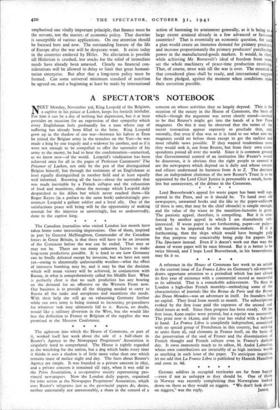A SPECTATOR'S NOTEBOOK
NEXT Monday, November 3rd, King Leopold of the Belgians, a captive in his palace at Laeken, keeps his fortieth birthday. For him it can be a day of nothing but depression, but it at least provides an occasion for an expression of that sympathy which every Englishman feels profoundly for a man whose cup of suffering has already been filled to the brim. King Leopold grew up in the shadow of one warâbetween his halves at Eton he joined the Belgian army in the trenches on the Yserâhe was made a king by one tragedy and a widower by another, and as if it were not enough to be compelled to offer the surrender of his army to the enemy, he had to bear the condemnationâunmerited, as we know nowâof the world: Leopold's vindication has been achieved once for all in the pages of Professor Cammaerts' The Prisoner of Laeken, not only by the pen of that distinguished Belgian himself, but through the testimony of an Englishman at least equally distinguished in another field and at least equally well informed. Knowing all the factsâabout the surrender that was made inevitable by a French collapse and the exhaustion of food and munitions, about the message which Leopold duly despatched to his Allies but which never reached themâSir Roger Keyes (in a preface to the same book) unhesitatingly pro- nounces Leopold a gallant soldier and a loyal ally. One of the satisfactions peace will bring will be the opportunity of making amends for the injustice so unwittingly, but so undeservedly, done to the captive king.
* * * *






















 Previous page
Previous page